Hello bloggers. Today in social studies we are learning about slavery.
Hello bloggers. Today in social studies we are learning about slavery.
Hello bloggers, today in health we are learning about drugs.
Cocaine
Cocaine is one of the most dangerous drugs known to man. If a person begins taking the drug, it would be almost impossible to become free of its grip both physically and mentally.
Consequences:
LSD
LSD is one of the most potent, mood-changing drugs. LSD feeds off your imagination so every person’s experience is different and unique.
Consequences:
Hello bloggers.
The truth about blood diamonds
Blood diamond or conflict diamond is a thing. It’s called a blood diamond because the diamond worker who mined it dies because of various reasons. They don’t get paid well and are forced to mine the diamonds. If the miners try to escape or keep a diamond, they might get either amputated, tortured, or death as an example. Also the warlords who control the mines use that money and spark conflict. They might try to overthrow the government and by doing that they might buy militias, bribe politicians, etc.
Conflict diamonds have funded wars in countries in Angola, Central African Republic, the Democratic Republic of the Congo, Liberia, and Sierra Leone.
Kimberley Process Certification Scheme
The Kimberley Process Certification Scheme is a scheme that attempts to halt and block the trade of blood diamonds. The scheme was launched in 2003 and was named after Kimberley, South Africa, a diamond-trading centre. It has 59 participants, with the European Union and its 27 members counting as a single participant, and together represent all of the major diamond-exporting and diamond-importing countries of the world. If a country didn’t comply with the terms, a country can be denied admission, or a participating country can be removed from the list. The Republic of the Congo was expelled from the Kimberley Process in 2004. The reason was that their diamond exports exceeded their domestic production of diamonds, which strongly imply that the exported diamonds were smuggled from rebel areas in neighbouring countries, particularly the Democratic Republic of Congo. In 2007, the Republic of Congo readmitted after its government effectively regulated the diamond industry.
Under the terms of the Kimberley Process, all of the participants must:
Set up an import/export control system for blood diamonds.
Commit to transparent practices and to the exchange of statistical data.
Only trade with other countries who comply with the agreement.
Certify shipments as conflict-free and to provide a certificate as proof.
The participants actively prevent 99.8% of blood diamond trade however there are limitations. One of the limitations is that it has a narrow definition of blood diamond. Kimberley Process’ definition is ‘rough diamonds used by rebel movements to finance wars against legitimate governments’. The Kimberley Process does not have the authority to address the broader range of risk to human rights posed by the trade of diamonds and It has refused to broaden the definition.
In conclusion, loopholes in the Kimberley Process and the failure to effectively adapt to address a broader range of human rights concerns means that diamonds associated with abuses taint the global diamond market.
Sources:
Antwerp Diamond District
Antwerp’s diamond district or the Diamond Quarter is the biggest diamond market. Antwerp is known as the diamond capital of the world and has focused on diamond trade since the 15th century. Lodewyk van Bercken was a Flemish jeweller and diamond cutter, he is renowned in the industry for inventing the scaif in 1456. It revolutionised the diamond industry because it can make a diamond sparkling and multifaceted, and with it attracted European aristocracy. In 1477, Maximilian I presented his wife-to-be Mary of Burgundy with a diamond ring, establishing the tradition of diamond engagement rings, this sparked a trend of European aristocracy. In 1947, De Beers’ had launched its now classic slogan “A Diamond is Forever,” the durability and price of a diamond conveyed the meaning that marriage is forever and priceless. The slogan changed people’s views about diamonds being reserved only for the rich and created a demand for diamonds by convincing people that no marriage is complete without a diamond ring.
Sources:
Perspectives
In this essay I will discuss the perspectives about the miners and the legitimate government having the blood diamonds problem.
The miners who worked in the mines were treated horribly. The RUF (Revolutionary United Front) would kidnap children and force them to be their slaves. The children would forcefully their army as soldiers (child soldiers) and the women would get raped. Men, women, and children are used as slaves to collect diamonds, and they have to use their bare hands to dig for diamonds instead of using tools. They would only get $2 per month or wouldn’t even get paid at all. If they have to go to the toilet they have to do it where they are mining, and if the miners try to escape or keep a diamond, they might get either amputated, tortured, or death as an example for the other miners. This is the violation of article 5 of the Universal Declaration of Human Rights which indicates a person has the freedom from torture, article 4 which indicates a person has the freedom from slavery, and more. The miners have to give the diamonds that they mined to the warlord (boss) and would be traded for arms (weapons, ammo, artillery, vehicles, etc).
The Revolutionary United Front (RUF) was a rebel group that fought against the legitimate government in Sierra Leone that started in 1991 and ended in 2002. Initially, the RUF was popular with many Sierra Leoneans, many of them not liking the official government and the RUF’s promised free education and healthcare. The RUF’s slogan was “No More Slaves, No More Masters. Power and Wealth to the People.”
The National Union for the Total Independence of Angola (UNITA) was a political party that was originally founded to free the nation from Portuguese rule. At first they had a Maoist ideology, but it later adopted an anti-left stance and began cooperating with the Portuguese against the Soviet-supported Popular Movement for the Liberation of Angola (MPLA). When Angola had their independence the MPLA announced the independent People’s Republic of Angola in November 1975 and they began an offensive against the FNLA (National Liberation Front of Angola) and UNITA. Although the FNLA dropped out of the struggle for Angola, UNITA continued to battle against the MPLA. The MPLA negotiated with UNITA by having a multiparty system. They negotiated in Lisbon in May 1991 and UNITA agreed for a cease-fire, and had an election. In 1992, Jonas Savimbi and José Eduardo dos Santos ran for president and dos Santos won the election. Despite the international observers who said the elections were fair, Savimbi and UNITA claimed it was rigged and returned to armed conflict. Another ceasefire agreement, the Lusaka Accord, was signed in 1994, but Savimbi fought on, using the money he got from the diamond mines (blood diamonds).
Sources:
Word Table
| Word | Meaning | Use in a sentence |
| Concept | It is a thought, an idea. Something that is conceived in the mind. | The concept of an equitably world is easy to imagine but difficult to create. |
| Wealth | An abundance of valuable possessions or money. | Joshua has an abundant amount of wealth. |
| Disparity | Huge (and usually unfair) differences in wealth between rich and poor people. | There is a huge disparity between the rich and the poor. |
| Manipulate | To control or influence something, often in a skillful or cunning manner, to achieve a desired outcome. | Travis can manipulate other people. |
| Poor | A state of lacking sufficient material possessions, resources, or wealth to meet basic needs and live comfortably. | Ken is poor and couldn’t pay his debt. |
| Critical thinking | The process of analysing, evaluating, and interpreting information or situations in a reasoned manner. | Aaron used critical thinking to analyse the situation. |
| Skills | Abilities that a person has through learning, practice, and experience. | A chef has cooking skills and can make food. |
| Empathy | Understanding the feelings of another person. | I need to practise empathy. |
| Equality | The state of being equal, particularly in terms of rights, opportunities, and treatment. | It took us years to give people the same equality. |
| Equity | Giving the one who is disadvantaged a helping hand to being truly equal to the other. |
Hello bloggers, in health we have been studying about Death, Dying, and the Afterlife. We watched Coco, learned about the Day of the Dead, and the Victorian Era.
In today’s blog I have chosen to investigate famous historical deaths.
Some famous historical deaths are the assassination of Abraham Lincoln, the assassination of Archduke Franz Ferdinand, Adolf Hitler’s suicide, etc. Some of these deaths had changed some parts of history like for example, Abraham Lincoln death changed the history of America.
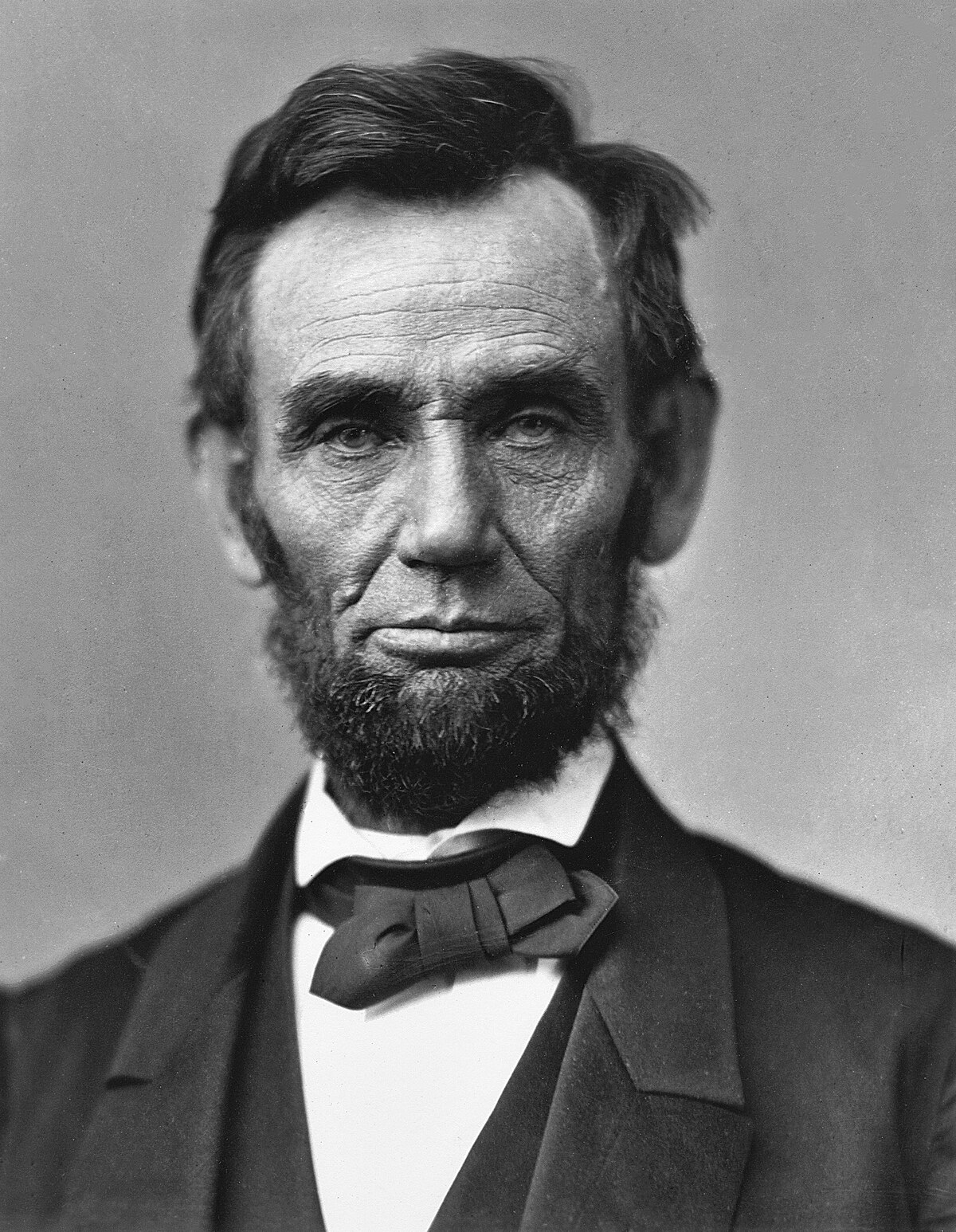
Abraham Lincoln is very a very popular person because he ended the American civil war in the Confederacy’s defeat, ended slavery in the US, and gave African-Americans civil and social freedoms. Lincoln had a good plan for the reconstruction after the civil war but after his assassination, the president after him, Andrew Johnson, led the US into a rough path.

The death of Franz Ferdinand was very important because after his assassination, Austria-Hungary declared war on Serbia in July 28 1914, starting World War I, and changing the 20th century.

Adolf Hitler is widely considered the most evil man in the world and rightfully so. He started World War II (The bloodiest conflict of all time), started the Holocaust which roughly killed 6 million Jews, conquered most of Europe, indoctrinated the country to think that the Aryan race is superior and all of the other races are inferior, etc. It is a good thing that Hitler is dead because he would completely destroy and pummel Europe to the ground.
Here are some more famous historical deaths.
How did you demonstrate respect towards others’ cultural beliefs that are different to yours? There were a number of ways that I demonstrated respect towards other culture beliefs during this unit. I did this by keeping an open mind, listening to why they would do it, etc.
Why is it important that you take care of all areas of hauora when we experience change, loss, or grief? It’s important to take care of your hauora is because for taha tinana, you may need to do some exercise so that you can think of something else other than grieving and so that you can’t let your body go. For taha whanau, you can talk to your friends about your loss. It’s pretty important to take care of taha whanau that you can’t isolate yourself from society. For taha hinengaro, it’s best to let your emotions out and not bottle it up so that you may not have an emotional breakdown. For taha wairua, you can spend time in nature so it may calm you down and not think about grief. It’s pretty important that to take care of it your beliefs may not wane and crack.
Thank you for reading.
Aim: To run an Electrophoresis Gel,
Research:
Theory:
DNA is a modular molecule made up of 4 smaller nucleotide units, which are abbreviated A,T,G, and C. These units connect in specific pairs, A connects with T, and G connects with C. The DNA we used for this experiment is from lambda in its linear form. Lambda is a virus. Viruses work by infecting, taking over a cell, and reprogramming it into a virus production factory. Restriction enzymes are specialised at cutting DNA and recognising 5 specific 4-8 nucleotide sequences. Gel Electrophoresis uses Agarose, one of the main components of agar, is a polysaccharide, isolated from seaweed. And so because the backbones of the DNA strands are negatively charged, when you put a positive electrode at the far end of the gel to the wells, they will want to move through the gel. The Gel runs for 10 minutes, and then we look at the stripes that the DNA lengths make in the Gel.
Method:
We practised by using the kit, putting dots of coloured water onto paper sheets. Then we did the experiment.
We had 5 samples,
U label means Uncut, and was put in well number 3.
H label means HindIII, and was put in well number 5.
E label means EcoR I, and was put in well number 4.
D label means Double, and was put in well number 2.
L label means for Ladder, and was put in well number 1.
Results:
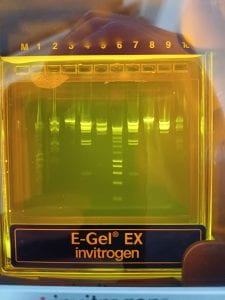


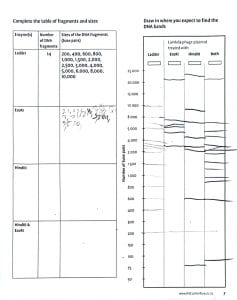
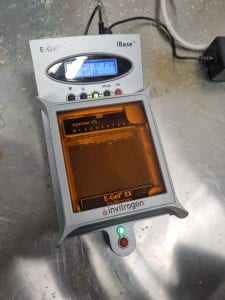


Hello bloggers, today in health we are learning about death, dying & the afterlife.
There are a number of strategies that a person can implement to help them get through coping with the loss of someone important to them. Although I’m not an expert in this topic here are five strategies that I suggest:
This will enhance their hauora by accepting that loss and move on. You can reminisce about the past but you can’t stay in the past, you have to look into the future, cherish the memories of that person, and bond with the people you have now.
Hello bloggers, in P.E we are playing a sport called Handball. In this blog I’m gonna tell you about
Country of Creation: Denmark, 1896
Equipment: Ball, net, (Optional) Bibs
Players on the court per team: 7 people in each team.
The top 4 countries in the world:
Size of the court: 40 by 20 metres
The goal zone: Goal crease
Court Layout: The goals are surrounded by a near-semicircular area, called the zone or the crease, defined by a line six metres from the goal. A dashed near-semicircular line nine metres from the goal marks the free-throw line. Each line on the court is part of the area it encompasses. This implies that the middle line belongs to both halves at the same time.
Type of ball: Ace ball
Duration of a standard game: two 30-minute halves with a 10- or 15-minute half-time intermission
Things you are not allowed to do in the court:
Hello bloggers, today in PE we are playing a sport called Korfball.
Da rules:
Facts about Korfball
Country of origins: Netherlands
Equipment: Net, ball, court
Players on the court per team: 8 people per team.
Court layout: The size of the indoor court is 20 m × 40 m. The court is divided into halves called zones. In each zone is a 3.5 m tall post with a basket at the top.
Other sports are part of korfball: Basketball and netball
Aim: To extract DNA from Bananas.
Equipment:
Method:
Results:


The result is that this bloke here has successfully extracted the DNA from the banana. He is being too jolly from extracting DNA.
Discussion:
The DNA appears to be slimy, white, mush banana in my opinion but only because we might’ve screwed up. If we used a different fruit or vegetable, then I think the DNA would still look the same because I think that all DNA looks the same.
What is the role of the detergent in the experiment? We need the detergent so that it dissolves the fatty molecules that hold cell membranes together, which releases the DNA into the solution.
Hello bloggers.
In Science we are building a paper bridge that is strong enough to carry stuff. This is a competition to see which bridge is the strongest and I’m very certain that our bridge is pretty strong enough to be in the top 3 but not very certain about being the strongest.
The rules of the competition are:
Some bridge designs I have researched are:


This is the bridge that my group would try to make:
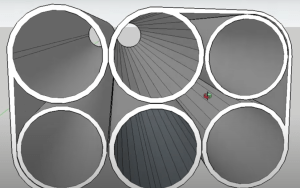
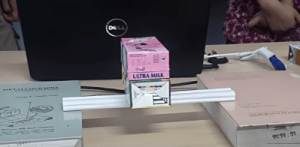
It is kind of like 6 pipes taped together but more complicated and I can’t really explain it. The method on how to make this type of bridge is in this Link. In the video they used glue but we can’t use glue, so we have to substitute it for tape. Although it wouldn’t be as good but in my opinion it would still be tough enough to carry some heavy objects like milk cartons.
Results:
Our one managed to hold up for 45 g but in my opinion we could’ve gone better if we made it wider and longer but all in all we did pretty well.